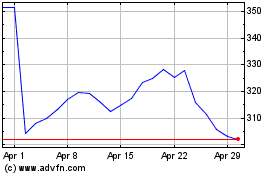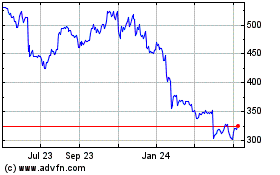Value-Based Care Simplifies Healthcare for Patients and Clinicians, New Report Finds
06 February 2025 - 12:45AM
Business Wire
Over a decade of Humana’s research shows
value-based care improves patient outcomes
Value-based care results in patients spending more time with
their primary care clinician, less time in the hospital, and more
frequent preventive care, based on research released today by
leading health and well-being company Humana Inc. (NYSE: HUM) in
its annual Value-Based Care Report.
This press release features multimedia. View
the full release here:
https://www.businesswire.com/news/home/20250205385393/en/
Over a decade of Humana’s research shows
value-based care improves patient outcomes. (Photo: Humana)
The report’s data shows that Medicare Advantage (MA) patients
receiving care under value-based arrangements saw fewer emergency
department visits, fewer inpatient hospitalizations, and received
more preventive care screenings.
Clinicians under the traditional fee-for-service model are
reimbursed based on the volume of patients and services provided,
with no incentive to reduce costly or low-value interventions. The
value-based model emphasizes preventive care and incentivizes
health outcomes.
“Coordinated care that delivers the right care at the right time
must become the standard,” said Dr. Kate Goodrich, Chief Medical
Officer at Humana. “Our report paints a clear picture:
value-based practices deliver better patient experiences and health
outcomes. Patients spend more time with their primary care
clinician, which means more preventive care and better management
of chronic diseases, like diabetes and high blood pressure. Seniors
in value-based care models receive the care they deserve with a
clinician who holistically understands their care needs. At Humana,
we are committed to advancing value-based care as the best model
for improving health outcomes and the healthcare experience for
seniors everywhere.”
A Smarter Healthcare Model
The need to accelerate value-based adoption is more imperative
than ever. Clinicians are increasingly experiencing high levels of
burnout, while patients struggle with a fragmented healthcare
system characterized by disjointed appointments, and lack of
coordinated care.
Value-based agreements range from financial rewards to full-risk
reimbursement models allowing practices to choose what works best
for them. Clinicians are incentivized to prioritize high-value,
preventive care to keep patients healthy longer. As practices
mature in value-based arrangements, care coordination becomes more
effective across care teams, which results in more high value
services and fewer unnecessary or duplicative services. With the
alignment of financial incentives to delivery of high-quality care,
care gaps close and patient engagement increases under an
integrated clinical team.
Based on more than a decade of Humana’s data, value-based
care advances:
- Patients spend more time with their primary care clinician and
have fewer emergency department and hospital visits, in turn
reducing costly, low-value care.
- A clinical team-based approach to care coordination - after a
hospital stay, between primary care visits, or when beginning a new
medication.
- A sustainable healthcare system, where patients, clinicians,
and payers benefit from the financial stability and better outcomes
of value-driven models.
- Technology integrations allow for real-time, actionable data at
the fingertips of clinicians to eliminate gaps in care.
Key Findings from the report:
- Regular primary care appointments mean better prevention and
healthcare maintenance. In 2023, value-based care members saw their
primary care clinicians 10% more than non-value-based care
patients.
- VBC Medicare Advantage patients report 90 out of 100
satisfaction with their healthcare provider, per Consumer
Assessment of Healthcare Providers and Systems (CAHPS) survey
data.
- Less time spent in the hospital. VBC Medicare Advantage
patients saw 32.1% fewer inpatient admissions in 2023 versus those
enrolled in Original Medicare.
- Humana Medicare Advantage members treated by value-based
clinicians experienced 11.6% fewer ER visits and 7.2% fewer
admissions than those not in a value-based arrangement.
- Humana Medicare Advantage members receive more preventive
screenings than those under non-value-based practices across these
measures: annual wellness exam, colorectal screening, diabetes eye
exam, and mammogram.
- Value-based care allows for better chronic disease management.
Humana Medicare Advantage members were more likely to receive
diabetes care eye exam screenings and to meet blood sugar control
measures versus members not in a value-based care arrangement.
- Senior-focused primary care organizations (PCOs) combine a VBC
model with a care delivery approach tailored for seniors. Black
patients visited their senior-focused primary care clinician 39%
more and low-income beneficiaries had 21% more visits versus
Original Medicare.
- Senior-focused primary care patients had 17% more primary care
visits, 6% fewer hospitalizations and 11% fewer emergency
department (ED) visits.
- Value-based arrangements allow for investments in benefits
members value most at an affordable price. In 2023, Humana Medicare
Advantage value-based arrangements saved 25.8%, in medical costs
compared to Original Medicare. Humana invests these savings
directly into more member benefits, such as lower premiums, home
care, prescription delivery and healthy food cards.
Beyond Primary Care
The new report also spotlights how value-based arrangements in
specialty practices positively impact patient outcomes. Humana MA
patients aligned to value-based nephrology programs experienced 5%
fewer unnecessary hospitalizations versus fee-for-service
clinicians.
"We must unite to address clinicians’ pain points, creating a
system where every stakeholder can prioritize health first,” said
George Renaudin, Humana’s Insurance President. “Over a decade of
our experience and research shows that providers navigating the
shift to value achieve greater success with proactive support, an
operational roadmap and actionable data. The path forward is clear:
the value-based model is the future – we have seen it in action,
and it’s the key to sustainable, patient-centered care.”
Humana offers a practical how-to-guide for successful
value-driven operations. Real-time, integrated data systems are a
first step for any practice in moving toward value. For a
sustainable healthcare system, the value-based care model is a
necessity for patients and clinicians.
Read Humana's Value-Based Care Report in full here.
About Humana
Humana Inc. (NYSE: HUM) is committed to putting health first –
for our teammates, our customers, and our company. Through our
Humana insurance services, and our CenterWell health care services,
we make it easier for the millions of people we serve to achieve
their best health – delivering the care and service they need, when
they need it. These efforts are leading to a better quality of life
for people with Medicare, Medicaid, families, individuals, military
service personnel, and communities at large. Learn more about what
we offer at Humana.com and at CenterWell.com.
View source
version on businesswire.com: https://www.businesswire.com/news/home/20250205385393/en/
Media Contact Cait Crenshaw Whatley Humana Corporate
Communications cwhatley@humana.com
Humana (NYSE:HUM)
Historical Stock Chart
From Jan 2025 to Feb 2025

Humana (NYSE:HUM)
Historical Stock Chart
From Feb 2024 to Feb 2025
